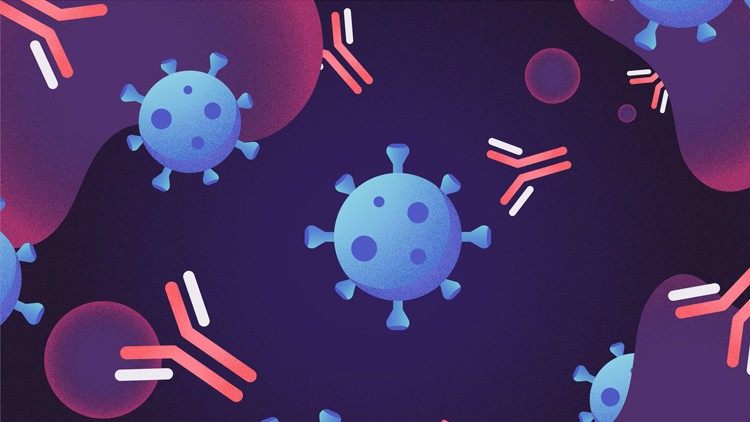Biotechnology: Antibodies & their role in Therapeutics
Learn about Antibodies: Their Structure, Types, Functions, and Role in Therapeutics & Diagnostics | Immunology | Biology
What you’ll learn
Biotechnology: Antibodies & their role in Therapeutics
-
1. Structure of antibodies
-
2. Types of light and heavy chains of antibodies
-
3. Complementarity Determining Regions (CDRs) & how they bind to the antigen
-
4. Immunoglobulin domains
-
5. Framework region
-
6. Classes of antibodies: IgG, IgM, IgA, IgE, IgD & their biological activities
-
7. What are opsonization, ADCC, and complement system
-
8. Pathways of complement activation
-
9. Regulation of the complement system
-
10. Organization and expression of immunoglobulin genes
-
11. Mechanism of VJ and VDJ recombination
-
12. Generation of antibody diversity
-
13. Somatic Hypermutation
-
14. Class switching mechanism & factors governing it
-
15. Expression of membrane-bound & secreted forms of immunoglobulins
-
16. B cell receptors (BCRs)
-
17. Simultaneous expression of IgM and IgD on B cells
-
18. Regulation of Ig gene transcription
-
19. Differences between polyclonal and monoclonal antibodies
-
20. Hybridoma Technology
-
21. Therapeutic monoclonal antibodies
-
22. Antibody engineering: Chimeric monoclonal antibodies
-
23. Humanized monoclonal antibodies
-
24. Fully human monoclonal antibodies
-
25. Immunogenicity of engineered monoclonal antibodies
-
26. Immunotoxins
-
27. Bispecific antibodies
-
28. Abzymes
-
29. Convalescent plasma therapy
-
30. How is plasma therapy being used for the treatment of COVID-19 disease
Requirements
-
Knowledge of basic biology
-
Motivation to learn
Description
The immune system is the body’s army that fights against invading pathogens and toxins. You can compare it to a nation’s defense forces. The army, the air force, and the navy all work for the nation’s defense. Similarly, the immune system works for the body’s defense. Everywhere around us, there are dangerous bacteria, viruses, parasites, and toxins that can attack and harm our bodies. But our immune system defends us from these pathogens.
Antibodies, also known as immunoglobulins, are crucial warriors produced by our immune system to fight off these nasty invading pathogens. In absence of antibodies, these pathogens can attack our nerve cells, kidney cells, heart cells, and other vital parts of the body.
Once attacked by these nasty pathogens, the cells stop functioning, which in turn, may lead to serious illness. But when antibodies come into action, everything changes. They bind to invading pathogens and prevent them from attacking our body cells.
So what do these antibodies look like, what is their structure and how do they fight off such dangerous pathogens? If you are also curious about these concepts and want to learn the science behind them, then you have come to the right place.
Biotechnology: Antibodies & their role in Therapeutics
This course is an invaluable resource for medical students, doctors, and students of disciplines like biotechnology, biology, immunology, genetics, molecular biology, cell biology, and bioinformatics. In the course, the most challenging concepts are presented in a simple and palatable format using animations and graphics.
This course will cover different types of antibodies circulating in the bloodstream & tissue fluids and their respective functions. Additionally, this course will also cover the genetic mechanisms which allow our immune system to generate such a diverse pool of antibodies because of which our body can recognize and respond to a variety of antigens.
Further in this course, the class switching mechanism, expression of membrane-bound & secreted forms of antibodies, and regulation of expression of immunoglobulin genes have also been discussed.
Moreover, you will also get to know what is passive immunity and what is active immunity.
We will also discuss the differences between polyclonal and monoclonal antibodies. In this course, the hybridoma technology has been discussed in detail as to how it can be used to mass-produce monoclonal antibodies. And how monoclonal antibodies can be used as therapeutics?
Additionally, this course will introduce you to various engineered therapeutic antibodies like chimeric monoclonal antibodies, humanized monoclonal antibodies, and fully human monoclonal antibodies. In this course, you will get to know how the antibody structure can be leveraged to create immunotoxins, bispecific antibodies, abzymes, etc for the treatment of cancer, arthritis, and other viral, hormonal, and autoimmune diseases.
In this course, we will discuss what is convalescent plasma therapy or passive antibody therapy and how it is being used for the treatment of COVID-19 disease, the current ongoing pandemic. Last but not the least, the course will also highlight the relevance of antibodies in therapeutics and diagnostics.
With a 30-day return policy, there is nothing to lose. If you feel the course is not worth your money, you can return it and get your money back. Though, we assure you that you will not be disappointed by your wise decision of enrolling in this course.
Who this course is for:
- The course is designed for medical students, doctors, researchers, and students of biology, immunology, biotechnology, genetics, molecular biology, cell biology, and bioinformatics disciplines
- Any student who has an immune system as a subject in their curriculum
- Anyone looking to study biology or immunology at college or university and wants quick, to-the-point knowledge about antibodies
- Newly qualified teachers who need some great resources on antibodies
- Anyone who wants to get in-depth knowledge about antibodies and our immune system
Who this course is for:
- The course is designed for medical students, doctors, researchers, and students of biology, immunology, biotechnology, genetics, molecular biology, cell biology, and bioinformatics disciplines
- Any student who has an immune system as a subject in their curriculum
- Anyone looking to study biology or immunology at college or university and wants quick, to-the-point knowledge about antibodies
- Newly qualified teachers who need a good resource on antibodies
- Anyone who wants to get in-depth knowledge about antibodies and our immune system








